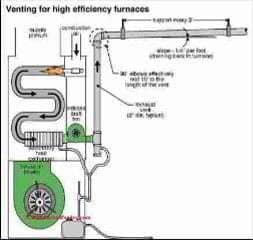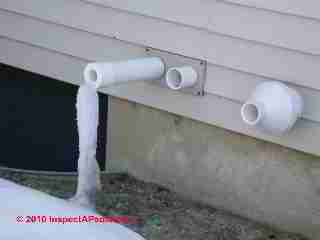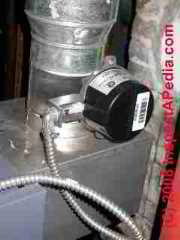 Heat Exchanger & Chimney Flue Damage From Heating Equipment Condensation
Heat Exchanger & Chimney Flue Damage From Heating Equipment Condensation
- POST a QUESTION or COMMENT about handling condensate from high efficiency boilers or furnaces
Condensation in chimneys & heating flues or equipment:
This article discusses damage to high efficiency heating equipment caused by condensation and corrosion to heat exchangers or flues, and we address the question of condensation and corrosion damage with older heating equipment that uses duty cycle controls.
InspectAPedia tolerates no conflicts of interest. We have no relationship with advertisers, products, or services discussed at this website.
- Daniel Friedman, Publisher/Editor/Author - See WHO ARE WE?
Causes of Condensation & Corrosion Damage at High Efficiency Condensing Boilers & Furnaces
 Does Condensation Damage occur with Older Heating Equipment?
Does Condensation Damage occur with Older Heating Equipment?
The question-and-answer article below paraphrases, quotes-from, updates, and comments an original article from Solar Age Magazine and written by Steven Bliss. Sketch at page top is courtesy of Carson Dunlop Associates, a Toronto home inspection, education & report writing tool company [ carsondunlop.com ].
Topic: High Efficiency & Conventional Heating Furnace or Boiler Damage from Condensation
Question: Did the change to stainless steel heat exchangers fix the condensation damage worry with high efficiency heating furnaces and boilers? What about older heating equipment that uses a duty cycle timer?
A heating salesman mentioned that lawsuits were pending (in 1985) against some manufacturers of high-efficiency furnaces (and boilers) - that although condensation problems had been solved through the use of stainless-steel heat exchangers, there were new problems arising from the lower-temperature flue gases.
Also, are there any documented cases of condensation damage in older furnaces (or boilers) stemming from the use of duty-cyclers lowering flue gas temperature? - Jeff A. Pendl, Enervision, Cincinnati OH
Answer: Higher Efficiency Heating Systems are Designed to Handle Corrosive Condensate
Higher-efficiency heating boilers and furnaces have cooler exhaust gases, which may condense in different parts of the system. If the entire system, including the heating unit itself and its venting components were not designed to handle the corrosive condensate, problems may occur.
See HIGH EFFICIENCY BOILERS/FURNACES
The very high-efficiency condensing furnaces and boilers are designed to condense liquid in the heat exchanger. While some early models had troubles (, we are not aware of any current problems or lawsuits.
See SAFETY RECALLS CHIMNEYS VENTS HEATERS
Condensing furnaces (warm air heat) or condensing boilers (hot water heat) use stainless-steel heat exchangers, plastic flue vent piping, and other system components that resist corrosion.
Watch out: if plastic vent piping for high efficiency heating equipment is not properly installed so that condensate is drained to a proper location, the system may become blocked or unsafe, as is happening in our photo, above left.
Problems Connecting a Higher Efficiency Furnace or Boiler to an Old Chimney and Flue
You are more likely to run into trouble when fitting a new, more efficient furnace or boiler to an old flue [especially with gas-fired heating equipment], or when retrofitting devices that lower flue gas temperatures.
In particular, problems are likely when the draft is already marginal due to a cold exterior chimney, extra long flue-vent-connector piping between the heater and the chimney, or other flue problems such as inadequate combustion air and very tight house construction.
See COMBUSTION AIR for TIGHT BUILDINGS and also the more technical problem discussion
at CHIMNEY WET TIME & CORROSION.
Also see CHIMNEY DAMAGE by LEAKS & FROST.
Watch out: inadequate draft, backdrafting, and inadequate combustion air significantly increase the risk of production of dangerous, possibly fatal carbon monoxide gas. Be sure that your home is protected by working, properly-installed, properly located smoke detectors and CO detectors.
For more information see CARBON MONOXIDE - CO
Effect of Duty Cyclers on Heating System Efficiency & Performance
As for the particular device you mentioned, a duty cycler, researchers at the America Gas Association Laboratory (AGA) suggest that they are unlikely to cause condensation problems.
[In at least part, that's because a properly designed and installed duty cycler must assure that the heating equipment runs long enough to reach proper operating temperature and thus also to vent properly.- Ed.]
Nor are duty cyclers likely to boost the efficiency of the heating system more than 1 or 2 percent.
Other energy savers such as heat reclaimers and automatic flue vent dampers (see Automatic Vent Dampers) like the one shown at left are more effective.
But stick with certified devices, follow the installation specifications, and consult with the manufacturer to be sure you have and are following the installation manual for the device.
Details about how to reduce heating costs are found
at HEATING COST SAVINGS METHODS.
Here we include solar energy, solar heating, solar hot water, and related building energy efficiency improvement articles reprinted/adapted/excerpted with permission from Solar Age Magazine - editor Steven Bliss.
Original article
The link to the original Q&A article in PDF form immediately below was preceded (above) by an expanded/updated online version of this article.
- Q&A on Heat Exchanger & Flue Damage from Condensation in Heating Boilers or Furnaces - PDF version, use your browser's back button to return to this page. Original article, Solar Age Magazine, September 1985, adapted and updated for InspectAPedia.com November 2010.
The preceding ext is reprinted/adapted/excerpted with permission from Solar Age Magazine - editor Steven Bliss.
...
Reader Comments, Questions & Answers About The Article Above
Below you will find questions and answers previously posted on this page at its page bottom reader comment box.
Reader Q&A - also see RECOMMENDED ARTICLES & FAQs
Question: hole in condensing furnace flue - plan to seal
(Dec 31, 2014) mr zippy said:
have a condenser glow worm sxi boiler 10 years old. Develope a small hole, after condenser trap block causing build up of water in exchange heater. will a 1200oc sealant repair the job until warmer weather,
Reply:
Zippo,
The question involves safety worries. I would give the manufacturer a call to ask this question.
...
Continue reading at HIGH EFFICIENCY BOILERS/FURNACES or select a topic from the closely-related articles below, or see the complete ARTICLE INDEX.
Or see these
Recommended Articles
- CONDENSING BOILERS/FURNACES
- CONDENSING BOILER/FURNACE CONDENSATE DRAIN
- SAFETY RECALLS CHIMNEYS VENTS HEATERS
- DIRECT VENT WIND PROBLEMS
Suggested citation for this web page
CONDENSING BOILERS/FURNACES DAMAGE at InspectApedia.com - online encyclopedia of building & environmental inspection, testing, diagnosis, repair, & problem prevention advice.
Or see this
INDEX to RELATED ARTICLES: ARTICLE INDEX to CHIMNEYS & FLUES
Or use the SEARCH BOX found below to Ask a Question or Search InspectApedia
Ask a Question or Search InspectApedia
Try the search box just below, or if you prefer, post a question or comment in the Comments box below and we will respond promptly.
Search the InspectApedia website
Note: appearance of your Comment below may be delayed: if your comment contains an image, photograph, web link, or text that looks to the software as if it might be a web link, your posting will appear after it has been approved by a moderator. Apologies for the delay.
Only one image can be added per comment but you can post as many comments, and therefore images, as you like.
You will not receive a notification when a response to your question has been posted.
Please bookmark this page to make it easy for you to check back for our response.
IF above you see "Comment Form is loading comments..." then COMMENT BOX - countable.ca / bawkbox.com IS NOT WORKING.
In any case you are welcome to send an email directly to us at InspectApedia.com at editor@inspectApedia.com
We'll reply to you directly. Please help us help you by noting, in your email, the URL of the InspectApedia page where you wanted to comment.
Citations & References
In addition to any citations in the article above, a full list is available on request.
- Solar Age Magazine was the official publication of the American Solar Energy Society. The contemporary solar energy magazine associated with the Society is Solar Today. "Established in 1954, the nonprofit American Solar Energy Society (ASES) is the nation's leading association of solar professionals & advocates. Our mission is to inspire an era of energy innovation and speed the transition to a sustainable energy economy. We advance education, research and policy. Leading for more than 50 years. ASES leads national efforts to increase the use of solar energy, energy efficiency and other sustainable technologies in the U.S. We publish the award-winning SOLAR TODAY magazine, organize and present the ASES National Solar Conference and lead the ASES National Solar Tour – the largest grassroots solar event in the world."
- Steve Bliss's Building Advisor at buildingadvisor.com helps homeowners & contractors plan & complete successful building & remodeling projects: buying land, site work, building design, cost estimating, materials & components, & project management through complete construction. Email: info@buildingadvisor.com
Steven Bliss served as editorial director and co-publisher of The Journal of Light Construction for 16 years and previously as building technology editor for Progressive Builder and Solar Age magazines. He worked in the building trades as a carpenter and design/build contractor for more than ten years and holds a masters degree from the Harvard Graduate School of Education. Excerpts from his recent book, Best Practices Guide to Residential Construction, Wiley (November 18, 2005) ISBN-10: 0471648361, ISBN-13: 978-0471648369, appear throughout this website, with permission and courtesy of Wiley & Sons. Best Practices Guide is available from the publisher, J. Wiley & Sons, and also at Amazon.com - Carrier Model BW9 Gas-Fired Condensing Boiler - Gas Fired Direct Vent Condensing Boiler - Example Installation & Operating Manual
- Carson Dunlop provides home inspection education including the ASHI-adopted a Home Inspection Home Study Course, and publications such as the Home Reference Book, the Home Reference eBook, and report writing materials including the Horizon report writer, and home inspection services. Alan Carson is a past president of ASHI, the American Society of Home Inspectors.
- Goodman Furnace High Temperature Plastic Vent HTPV safety recall US CPSC notice
- HEATING SYSTEMS (see master list of heating articles at the ARTICLE INDEX the bottom of this article )
- LENNOX HVAC MANUALS & PARTS GUIDES
- Our recommended books about building & mechanical systems design, inspection, problem diagnosis, and repair, and about indoor environment and IAQ testing, diagnosis, and cleanup are at the InspectAPedia Bookstore. Also see our Book Reviews - InspectAPedia.
- In addition to citations & references found in this article, see the research citations given at the end of the related articles found at our suggested
CONTINUE READING or RECOMMENDED ARTICLES.
- Carson, Dunlop & Associates Ltd., 120 Carlton Street Suite 407, Toronto ON M5A 4K2. Tel: (416) 964-9415 1-800-268-7070 Email: info@carsondunlop.com. Alan Carson is a past president of ASHI, the American Society of Home Inspectors.
Thanks to Alan Carson and Bob Dunlop, for permission for InspectAPedia to use text excerpts from The HOME REFERENCE BOOK - the Encyclopedia of Homes and to use illustrations from The ILLUSTRATED HOME .
Carson Dunlop Associates provides extensive home inspection education and report writing material. In gratitude we provide links to tsome Carson Dunlop Associates products and services.


